2021年深圳市%20寒假中考一轮词汇复习教案八年级下册Unit1-unit%202%20(无答案)
中考英语 八下 Units 1-2词汇复习导学案
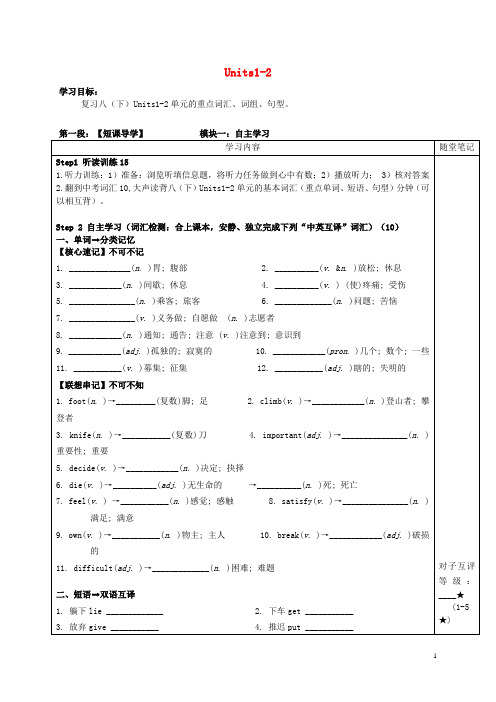
小组内相互检查练习完成情况;小声交流,并相互评定等级。(1-5★)
对子互评等级:____★
(1-5★)
第二段:【长课导学】模块二:交流研讨
交流研讨内容
随堂笔记
Step4交流研讨
请翻到《聚焦中考》P48-50页,先独立完成:考点聚焦考点6-9,然后组长组织组员讨论并讲解。
模块三:当堂训练1、用时:10分钟2、训练方式:独立完成3、互动(整理提高)
5. decide(v. )→____________(n. )决定;抉择
6. die(v. )→__________(adj. )无生命的→__________(n. )死;死亡
7. feel(v. )→___________(n. )感觉;感触8. satisfy(v. )→_______________(n. )满足;满意
今日不足_____________________________________________________________________________ __
教学后记:_____________________________________________________________________________ __
3.放弃give ___________ 4.推迟put ___________
5.照顾;非常喜欢care ___________ 6.赠送;捐赠give _____________
7.修理;装饰fix ___________ 8.建立;设立___________ up
9. make a difference ____________________ 10. take one’s temperature_______________
人教版中考英语一轮复习第九讲八年级(下)Units1-2教学设计

人教版中考英语一轮复习第九讲八年级(下)Units 1-2教学设计一. 教材分析人教版八年级下册英语Unit 1和Unit 2主要围绕日常生活和学校生活展开,通过讲述Mike和其家人、朋友的生活经历,让学生掌握一般过去时态、一般现在时态、一般将来时态的运用,以及描述日常生活和学校生活中的事件。
这两个单元的话题贴近学生的生活,有利于激发学生的学习兴趣,提高学生的语言运用能力。
二. 学情分析八年级下册的学生已经掌握了英语学习的基本语法知识和词汇,具备一定的听、说、读、写能力。
但部分学生在语言运用方面仍有困难,对时态的掌握不够扎实。
因此,在教学过程中,需要关注学生的个体差异,针对不同学生的学习需求进行有针对性的教学。
三. 教学目标1.知识目标:(1)掌握一般过去时态、一般现在时态、一般将来时态的运用;(2)熟练运用本单元核心词汇描述日常生活和学校生活中的事件。
2.能力目标:(1)提高学生的听、说、读、写能力;(2)培养学生的语言运用能力和团队合作精神。
3.情感目标:(1)激发学生对英语学习的兴趣;(2)培养学生积极乐观的人生态度。
四. 教学重难点(1)一般过去时态、一般现在时态、一般将来时态的运用;(2)本单元核心词汇的掌握。
(1)一般过去时态、一般现在时态、一般将来时态在不同情境下的运用;(2)复杂句型的构建和表达。
五. 教学方法1.情境教学法:通过设定生活情境,让学生在实际语境中学习、运用英语。
2.任务型教学法:引导学生参与各种实践活动,提高学生的语言运用能力。
3.合作学习法:鼓励学生分组讨论、合作完成任务,培养学生的团队合作精神。
4.激励评价法:注重鼓励学生,激发学生的自信心和学习兴趣。
六. 教学准备1.教材:人教版八年级下册英语教材;2.课件:根据教学内容制作相应的课件;3.练习题:针对本节课内容设计练习题;4.教学道具:与课程相关的生活用品、图片等。
七. 教学过程1.导入(5分钟)利用图片、实物等引导学生谈论日常生活和学校生活中的事件,激发学生的学习兴趣。
八下Unit1-2复习教案
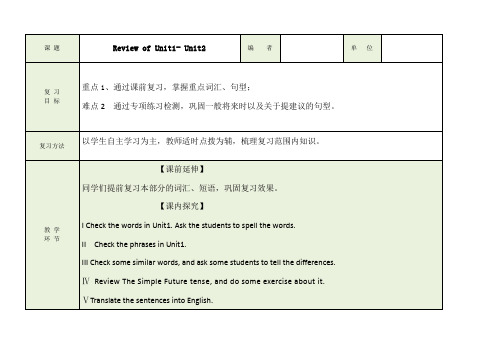
I Check the words in Unit1. Ask the students to spell the words.
II Check the phrases in Unit1.
III Check some similar words, and ask some students to tell the differences.
ⅧReview some useful expressions about giving advice.
ⅨTranslate some important sentences into English.
ⅩAsk students to write a composition about their future.
课题
Review of Unit1- Unit2
编者
单位
复习ቤተ መጻሕፍቲ ባይዱ
目标
重点1、通过课前复习,掌握重点词汇、句型;
难点2通过专项练习检测,巩固一般将来时以及关于提建议的句型。
复习方法
以学生自主学习为主,教师适时点拨为辅,梳理复习范围内知识。
教学
环节
【课前延伸】
同学们提前复习本部分的词汇、短语,巩固复习效果。
ⅣReview The Simple Future tense, and do some exercise about it.
ⅤTranslate the sentences into English.
ⅥCheck the words in Unit2.
ⅦCheck the phrases in Unit2.
八下英语1-2单元复习教案
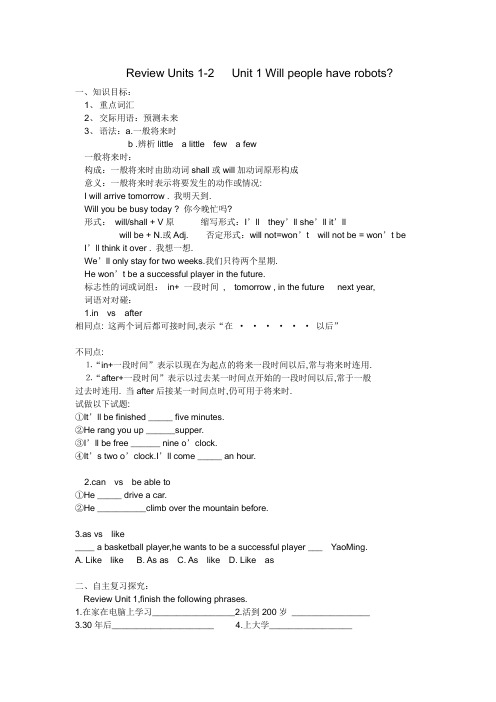
Review Units 1-2 Unit 1 Will people have robots?一、知识目标:1、重点词汇2、交际用语:预测未来3、语法:a.一般将来时b .辨析little a little few a few一般将来时:构成:一般将来时由助动词shall或will加动词原形构成意义:一般将来时表示将要发生的动作或情况:I will arrive tomorrow . 我明天到.Will you be busy today ? 你今晚忙吗?形式:will/shall + V原缩写形式:I’ll they’ll she’ll it’llwill be + N.或Adj. 否定形式:will not=won’t will not be = won’t be I’ll think it over . 我想一想.We’ll only stay for two weeks.我们只待两个星期.He won’t be a successful player in the future.标志性的词或词组:in+ 一段时间, tomorrow , in the future next year,词语对对碰:1.in vs after相同点: 这两个词后都可接时间,表示“在······以后”不同点:⒈“in+一段时间”表示以现在为起点的将来一段时间以后,常与将来时连用.⒉“after+一段时间”表示以过去某一时间点开始的一段时间以后,常于一般过去时连用. 当after后接某一时间点时,仍可用于将来时.试做以下试题:①It’ll be finished _____ five minutes.②He rang you up ______supper.③I’ll be free ______ nine o’clock.④It’s two o’clock.I’ll come _____ an hour.2.can vs be able to①He _____ drive a car.②He __________climb over the mountain before.3.as vs like____ a basketball player,he wants to be a successful player ___ YaoMing.A. Like likeB. As asC. As likeD. Like as二、自主复习探究:Review Unit 1,finish the following phrases.1.在家在电脑上学习_________________2.活到200岁________________3.30年后_____________________4.上大学_________________5.乘火箭到月球_____________________6.爱上____________________7.作为一名记者____________________ 8.单独居住_____________/感到孤独_________9.有能力做某事_______________10.实现________11.帮助某人做…_________________12.数百年_____________________/八百__________________活到live to be 成为现实come true有能力去be able to 将来in the future程序员computer programmer 多数人most of people空闲时间free time 度假on vacation/ holiday太空站space station 在家学习study at home更多污染more pollution 世界杯the world cup居住live in/on 滑冰go skating五年之后in five years 获奖win award放飞fly…to 作为一名记者as a reporter 爱上fall in love with 预测未来predict the future养宠物keep a pet 最…之一one of the + 最高级工作日期间during the week 电影公司movie company穿套装wear a suit 科幻science fiction成百上千hundreds of 试图try to看起来像look like 寻找look for醒来wake up 一遍又一遍over and over again变得厌烦get bored 穿过go through寻找look for三、完成句子:1. Mr. Smith _______(give) a talk tomorrow morning.2. Kids _______(not go) to school in the future.3. There __________(be) a sports meeting next Monday.4. There will be less pollution. (变为一般疑问句,并做回答)____________________________?______________. ________________.5. People will have robots in their homes.(同上)_______________________________?_______________.______________.四、交流释疑词语辨析few a few little a little_____________________________________________试一试1.----Can you speak English? ----Yes, but only______.A. littleB. a littleC. fewD. a few2.He has ____friends.So he always feels lonely.A. littleB. a littleC. fewD. a fewUnit 2 What should I do ?一、知识目标:1、重点词汇2、交际用语:谈论在学习、生活中遇到的问题,并提出相应合理的建议。
八年级下册第一第二单元复习教案
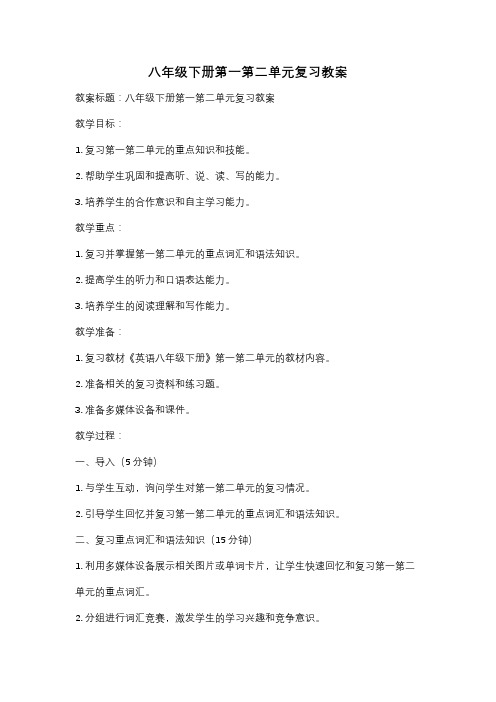
八年级下册第一第二单元复习教案教案标题:八年级下册第一第二单元复习教案教学目标:1. 复习第一第二单元的重点知识和技能。
2. 帮助学生巩固和提高听、说、读、写的能力。
3. 培养学生的合作意识和自主学习能力。
教学重点:1. 复习并掌握第一第二单元的重点词汇和语法知识。
2. 提高学生的听力和口语表达能力。
3. 培养学生的阅读理解和写作能力。
教学准备:1. 复习教材《英语八年级下册》第一第二单元的教材内容。
2. 准备相关的复习资料和练习题。
3. 准备多媒体设备和课件。
教学过程:一、导入(5分钟)1. 与学生互动,询问学生对第一第二单元的复习情况。
2. 引导学生回忆并复习第一第二单元的重点词汇和语法知识。
二、复习重点词汇和语法知识(15分钟)1. 利用多媒体设备展示相关图片或单词卡片,让学生快速回忆和复习第一第二单元的重点词汇。
2. 分组进行词汇竞赛,激发学生的学习兴趣和竞争意识。
三、听力训练(20分钟)1. 播放第一第二单元的听力材料,要求学生仔细听并回答相关问题。
2. 分组进行听力竞赛,提高学生的听力理解和合作能力。
四、口语练习(15分钟)1. 安排学生进行口语对话练习,让学生运用第一第二单元的句型和词汇进行交流。
2. 鼓励学生使用新的句型和词汇,提高口语表达的准确性和流利度。
五、阅读理解(20分钟)1. 分发阅读材料,要求学生阅读并回答相关问题。
2. 引导学生进行小组讨论,分享自己的理解和答案。
3. 教师对学生的阅读理解进行点评和指导。
六、写作练习(20分钟)1. 提供写作题目,要求学生根据所学知识和经验进行写作。
2. 引导学生进行互相批改和修改,提高写作的准确性和连贯性。
七、总结与反思(5分钟)1. 教师总结本节课的教学内容和学生的表现,给予肯定和鼓励。
2. 学生反思自己的学习情况,提出问题和建议。
教学延伸:1. 布置相关的课后作业,巩固所学知识。
2. 鼓励学生参加英语角、英语竞赛等活动,提高英语综合应用能力。
中考英语一轮复习教案 八年级下册Unit 2
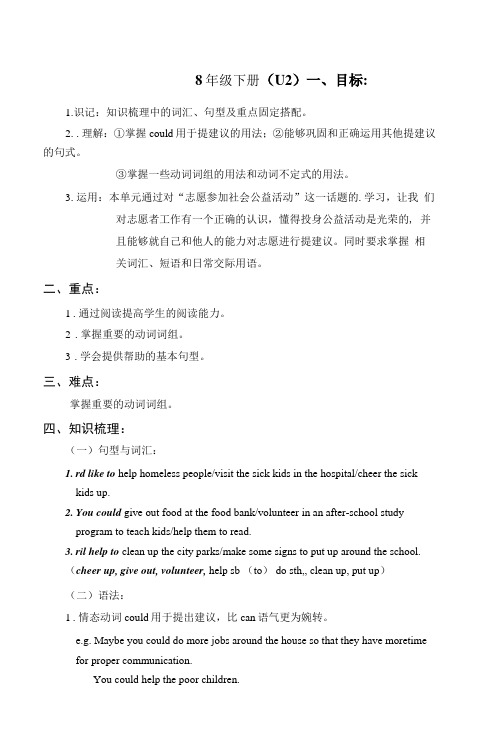
8年级下册(U2)一、目标:1.识记:知识梳理中的词汇、句型及重点固定搭配。
2..理解:①掌握could用于提建议的用法;②能够巩固和正确运用其他提建议的句式。
③掌握一些动词词组的用法和动词不定式的用法。
3.运用:本单元通过对“志愿参加社会公益活动”这一话题的.学习,让我们对志愿者工作有一个正确的认识,懂得投身公益活动是光荣的, 并且能够就自己和他人的能力对志愿进行提建议。
同时要求掌握相关词汇、短语和日常交际用语。
二、重点:1.通过阅读提高学生的阅读能力。
2.掌握重要的动词词组。
3.学会提供帮助的基本句型。
三、难点:掌握重要的动词词组。
四、知识梳理:(一)句型与词汇:1.rd like to help homeless people/visit the sick kids in the hospital/cheer the sickkids up.2.You could give out food at the food bank/volunteer in an after-school studyprogram to teach kids/help them to read.3.ril help to clean up the city parks/make some signs to put up around the school.(cheer up, give out, volunteer, help sb (to) do sth,, clean up, put up)(二)语法:1.情态动词could用于提出建议,比can语气更为婉转。
e.g. Maybe you could do more jobs around the house so that they have moretimefor proper communication.You could help the poor children.2.动词不定式(1)动词不定式的基本形式是“to+动词原形”,有时可以不带to。
人教版八年级英语下册Unit 1-Unit 2【复习课件】中考英语一轮大单元复习(人教版)

12.在这里做志愿者对我来说是梦想成真。
Volunteering here is a dream come true for me.
13.她每周在那里做一次志愿者,帮助孩子们学习阅读。
She volunteers there once a week to
help kids
to
read .
14.在你的帮助下,我才有可能拥有“幸运儿”。
5.发烧
have a fever
6.头疼 have a headache 7.休息 take breaks 8.以同样的方式 in the same way 9.think twice 三思;反复考虑 10.下车 get off 11.have a heart problem 有心脏病
12.to one's surprise 使……惊讶的;出乎……意料 13.thanks to 多亏;由于 14.及时 in time 15.right away 立即;马上 16.get into 陷入;参与 17.cut oneself 割伤某人自己
5.matter v.事关紧要;要紧;有重大影响 n.问题;事情
What's the matter? 怎么了?(n.)
It doesn't matter if the shoes feel a little tight. 这种鞋小点不要紧。(v.)
6.open v.开;打开 adj.开着的;敞口的 例:He opened the window and looked out.他打开窗户向外看。(v.) The fresh air blew in through the open door.新鲜的空气从开着的门 吹进来。(adj.)
2021年深圳市%20寒假中考一轮词汇复习教案八年级下册Unit1-unit%202%20(无答案)
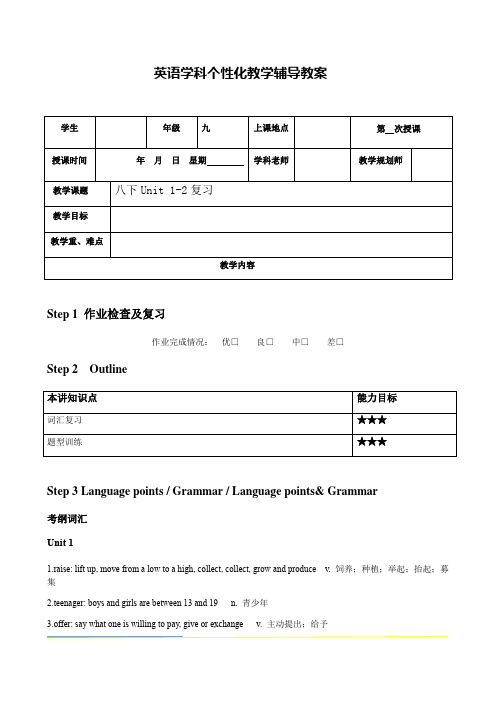
英语学科个性化教学辅导教案Step 1 作业检查及复习作业完成情况:优□良□中□差□Step 2 OutlineStep 3 Language points / Grammar / Language points& Grammar考纲词汇Unit 11.raise: lift up, move from a low to a high, collect, collect, grow and produce v. 饲养;种植;举起;抬起;募集2.teenager: boys and girls are between 13 and 19 n. 青少年3.offer: say what one is willing to pay, give or exchange v. 主动提出;给予4.illness: in bad health, state of being ill n. 生病;某种疾病(ill adj. 不好的;恶意的;有病的)5.suffer: feel or have pain, experience pain of difficulty v. 遭受;经历6.serious: important or thoughtful adj. 严重的;严肃的(seriously adv. 严肃地;严重地)anize: put into working order, arrange in a system v. 组织;筹划(organization n. 组织)8.lonely: sad, without companies adj. 孤独的;寂寞的(loneliness n. 孤独;寂寞)9.peace: quiet, calm, state of freedom from war n. 和平;宁静(peaceful adj. 和平的;平静的)10.hurt=injure/damage v. 使受伤;伤害(hurt-hurt-hurt)11.courage=bravery n. 勇气12.pay: give sb. money for goods or service v. 付费;付款(pay-paid-paid)13.pain: suffering of mind or body n. 疼痛(painful adj. 痛苦的)14.express: make known, show by words, looks, actions v. 表达;表示(expression n. 表情)15.spirits: state of mind (as being happy, hopeful, etc. or the opposite) n. 心境;情绪Unit 2municate=join or connect/ be in contact v. 传播;交流(communication n. 交流)2.accept=receive v.接受(acceptable adj. 可接受的)3.reject=refuse v. 拒绝4.gesture: movement of the hand or head n.姿势;手势5.message=a piece of news n. 信息;消息6.bored: make sb. feel tired by being dull adj. 无聊的;无趣的7.sign: take a deep breath v. 叹气8.appear=come along/show up v. 出现;显现(appearance n. 外貌;外观;出现)9.impression: effect produced on the mind or feeling n. 印象(impress v. 给......以深刻印象)10.towards: in the direction of/ near prep. 朝;向;接近11.hold: catch/get, keep in one’s possession v. 抓住;使保持(hold-held-held)12.remind: make sb. think of v. 使想起;提醒13.cross: mark made by drawing one line across another/ go across v. 使交叉;交叠;通过14.shake: move from side to side or up and down v. 使摇动;使震撼(shake-shook-shaken)15.sure=certain/confident adj. 确信的;有信心的(surely adv. 无疑;一定;确实)16.meaning: what is meant or intended n. 意思(mean v. 意思是;意味着)nguage: human method of communicating ideas, feelings by means of a system of sounds n. 语言18.matter: sth. to which attention is given; pieces of business n. 事情;事物19.nod: bow the head slightly and quickly as a sign of agreement or greeting v. 点头考纲短语Unit 11. Offer to do = help to do/supply to do 主动提出做某事2. Suffer... From...=go through/be in pain 遭受......灾难(病痛)3. Teach sb to do sth 教某人做某事4. Spend time (in) doing sth = It takes sb time to do sth 花时间做某事5. Continue doing sth = go on doing 继续做某事6. Have difficulty doing sth = have trouble doing sth 做某事有困难7. Need to do = require to do 需要做......8. Use sth for doing = use sth to do 用... ...做... ...9. Take photos of 给... ...照相10. Want to do = would like to do = feel like doing 想做某事11. Decide/plan/want/learn/begin/hope to do 决定/计划/想/学/开始/希望做某事12. Do some voluntary work 做义工13. A girl called Cindy = a girl named Cindy 一个叫做Cindy 的女孩14. Express one’s feelings 表达某人的感情15. Bring sb joy and peace = make sb joyful and peaceful 带给某人快乐平和Unit 21. Make a good impression on sb = give sb a good impression 给某人留下好印象2. Remind sb about sth = make sb remember sth /warn sb of sth 提醒某人记得某事3. Sit up 坐直了4. A well-dressed lady 一位衣着考究的女士5. Enter = go into 进入6. Make people feel welcome 让人觉得受欢迎7. Hold one’s head up 抬头8. At once = immediately = in no time = right away 立刻;马上9. Cross one’s arms 双手环抱胸前10. Try to do sth = attempt to do 努力做某事(try doing sth 尝试做某事)11. Decide to do = make a decision to = make up one’s mind to do 决定做某事12. Nod one’s head 点头shake one’s head 摇头13. Look friendly/happy/bored 看起来友好/开心/无聊重点句型(U1〜U2)1.We spent time with a girl called Vivien.我们和一个叫Vivien的女孩一起度过的时光。
2024年中考人教版英语一轮复习 梳理课件 八年级下册 Units 1~2

→ sickness/illness n. 病;疾病 13. breathe v. 呼吸
→ breath n. 呼吸
14. ourselves pron. 我们自己 → yourselves pron. 你们自己 → themselves pron. 他(她、它)们自己 → yourself pron. 你自己 → herself pron. 她自己 → himself pron. 他自己 → itself pron. 它自己
7.It is necessary for schools to satisfy (满足) the need of all the students’ development. (2017·安徽) 8.It was the Romans who grew the olive tree in the rest (剩余部分) of the southern
❋ Unit 2 ❋ 21. cheer v. 欢呼;喝彩
→ cheerful adj. 愉快的 22. volunteer v. 义务做;自愿做 n. 志愿者
◇ volunteer to do sth. 自愿去做某事 23. notice n. 通知;通告;注意 v. 注意到;意识到 24. alone adv. 独自;单独
4.The boy could give out food at the food bank. 这个男孩可以在食品救济站分发食物。
5.Clean-Up Day is only two weeks from now . 清洁日离现在仅仅只有两周的时间。 6.I want to put off my plan to work in an animal hospital until next summer. 我想把我在动物医院工作的计划推迟到明年夏天。 7.You helped to make it possible for me to have the dog. 在你的帮助下,我才有可能拥有这只狗。 8. Thanks to Jim’s father, I could get to school in time . 多亏了吉姆的爸爸,我才能够及时到达学校。 9.A friend of mine came up with a good idea. 我的一个朋友想出了一个好主意。
深圳新版英语八年级下复习资料(Unit1-4)说课材料
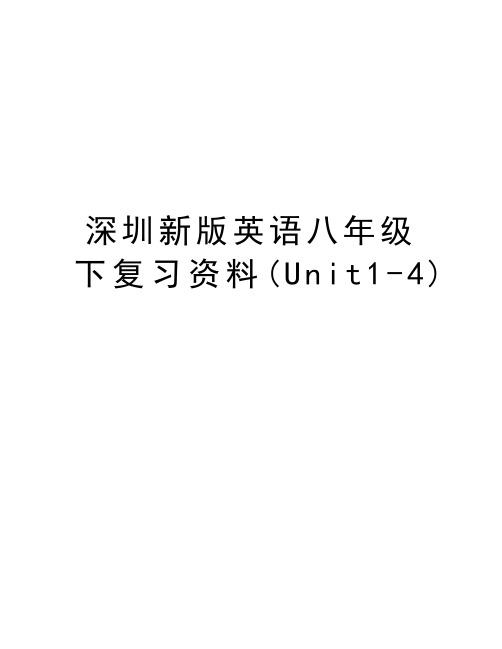
深圳新版英语八年级下复习资料(U n i t1-4)不定式:1.不定式的结构:肯定否定2.只能跟不定式做宾语的动词:choose,hope,offer,want,decide,learn,plan,wish,afford, agree, aim, appear, ask, believe,demand,determine, expect, fail, happen, intend, learn, long, manage, pretend, promise, prepare, refuse.巧记:三个希望两答应(hope,wish,want,agree,promise); 一个要求莫拒绝(demand,refuse)设法学会做决定(manage,learn,decide); 不要假装在选择(pretend,choose)3.省略to 的不定式:使役动词:感官动词:4.decide/know/learn/remember +疑问词+ to do5.动词+宾语+ to do即宾语补足语。
Teach sb to do sth ask sb to do sth注:有以上结构的常用动词有 tell. wish, ask, want,like, beg(请求), invite(邀请), warn(警告,提醒), allow, encourage, advise 等。
6.不定式做宾语和主语做主语的常用句型:It be adj. (for /of sb)to doIt is important to learn English well.It is important for us (learn) English well. It takes/took sb. some time to doIt takes me half an hour to walk to school every day.7.作宾语:it做形式宾语:当不定式做宾语且后面还带有补足语时,通常用it做形式宾语,把不定式放在宾语补足后面。
初中英语中考复习 中考英语(人教新课标)一轮复习教案:八年级下册Unit 1

第17课时课题:8年级下册(U1)一、目标:1. 识记:知识梳理中的词汇、句型及重点固定搭配。
2. 理解:走进情态动词should 的生活;反身代词。
3. 运用:①在听说方面,能够听懂并进行以What ’s the matter?为话题的简 单的健康话题的讨论;②在阅读方面,从材料中获取有关急救的信息; ③在写作方面,能够写一篇有关健康的文章。
二、重点:1.掌握表达身体部位的单词和表示疾病的名词;学会提建议的表达方式。
2.运用“What ’s the matter ? I have a ...” 来谈论健康问题。
3.通过运用should 来提建议。
三、难点:运用“What ’s the matter ? I have a ...” 来谈论健康问题。
四、知识梳理(一)句型与词汇:1.讨论健康问题:(1)--What ’s the matter ?--I have a stomachache. / --I have a sore throat/back. (2)--Do you have a fever?--Yes, I do./No, I don ’t./ I don ’t know.(3)--Does he have a toothache? --Yes, he does.与身体部位和疾病相关的单词和词组:stomach, throat, foot, neck, knee ,arm, back, ear, eye, hand, head, leg, mouth, nose, tooth; 词组:have a fever/headache, have a cough, have a cold . 2.提建议:(1)--What should she do?--She should take her temperature/take breaks/have a rest/lie dow n. (2)--Should I put some medicine on it ?中考一轮复习教学参考资料--Yes, you should./ No, you shouldn’t.(二)语法:1.问病症的几种句子:--What’s the matter (with you)? / What’s the trouble (with you)? / What’s wrong (with you)? --I have a fever.--What’s the m atter, Amy? --I have a cold.--What’s the matter wi th her/him/it? --She/He/It has a cold.2.用should和shouldn’t提建议:肯定:should+动词原形否定:should not (shouldn’t)+动词原形You should go to see a doctor.We shouldn’t listen to music in class.3. 代词汇总(反身代词只做“理解”层次的要求)主格宾格形容词性物主代词名词性物主代词反身代词第一人称单数I me my mine myself复数we us our ours ourselves第二人称单数you you your yours yo urself 复数you you your yours yourselves第三人称单数he him his his himselfshe her her hers herselfit it its its itself复数they them their theirs themselves(三)教材中的重点固定搭配1. lie down 躺下e.g. You’d better lie down and have a good rest.2.have a stomachache 胃痛e.g. He had a stomachache yesterday.3.have a cold 感冒4.take one’s temperature 量体温e.g. You had a bad cold and you’d better take your temperature.5.expect sb to do sth. 期望/希望/预料某人去做某事e.g. The driver expected most or all of the passengers to get off and wait for thenext bus.6.right away 立即,马上e.g. The old man had a heart problem and needed to go to the hospital rightaway.7.to one’s surprise 让某人意外的是e.g. To my surprise, all the classmates agreed to go with me.。
人教版中考英语一轮复习第九讲八年级(下)Units1-2说课稿
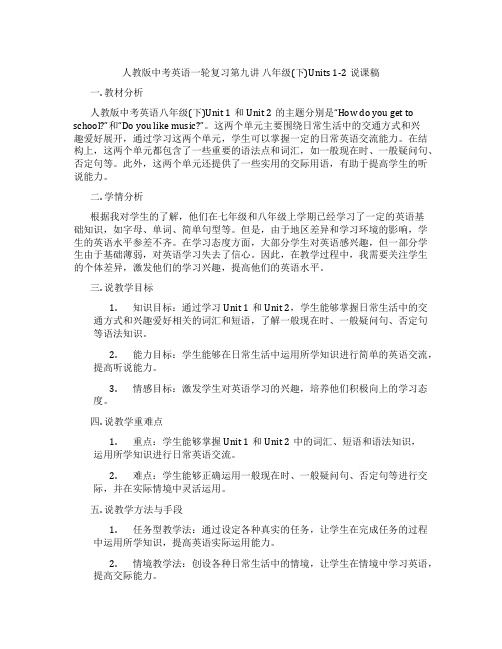
人教版中考英语一轮复习第九讲八年级(下)Units 1-2说课稿一. 教材分析人教版中考英语八年级(下)Unit 1和Unit 2的主题分别是“How do you get to school?”和“Do you like music?”。
这两个单元主要围绕日常生活中的交通方式和兴趣爱好展开,通过学习这两个单元,学生可以掌握一定的日常英语交流能力。
在结构上,这两个单元都包含了一些重要的语法点和词汇,如一般现在时、一般疑问句、否定句等。
此外,这两个单元还提供了一些实用的交际用语,有助于提高学生的听说能力。
二. 学情分析根据我对学生的了解,他们在七年级和八年级上学期已经学习了一定的英语基础知识,如字母、单词、简单句型等。
但是,由于地区差异和学习环境的影响,学生的英语水平参差不齐。
在学习态度方面,大部分学生对英语感兴趣,但一部分学生由于基础薄弱,对英语学习失去了信心。
因此,在教学过程中,我需要关注学生的个体差异,激发他们的学习兴趣,提高他们的英语水平。
三. 说教学目标1.知识目标:通过学习Unit 1和Unit 2,学生能够掌握日常生活中的交通方式和兴趣爱好相关的词汇和短语,了解一般现在时、一般疑问句、否定句等语法知识。
2.能力目标:学生能够在日常生活中运用所学知识进行简单的英语交流,提高听说能力。
3.情感目标:激发学生对英语学习的兴趣,培养他们积极向上的学习态度。
四. 说教学重难点1.重点:学生能够掌握Unit 1和Unit 2中的词汇、短语和语法知识,运用所学知识进行日常英语交流。
2.难点:学生能够正确运用一般现在时、一般疑问句、否定句等进行交际,并在实际情境中灵活运用。
五. 说教学方法与手段1.任务型教学法:通过设定各种真实的任务,让学生在完成任务的过程中运用所学知识,提高英语实际运用能力。
2.情境教学法:创设各种日常生活中的情境,让学生在情境中学习英语,提高交际能力。
3.小组合作学习:学生进行小组讨论和合作,培养他们的团队精神和合作能力。
八年级英语下册 Units 1-2(第2课时)复习教案 (新版)人教新目标版
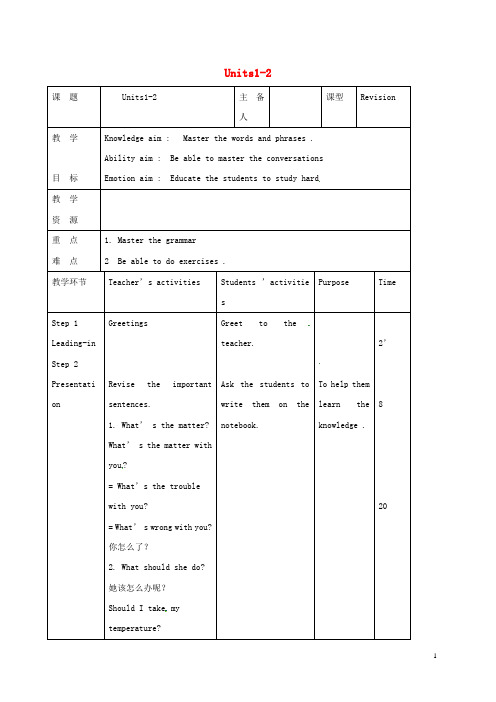
Units1-2课题 Units1-2 主备人课型Revision教学目标Knowledge aim : Master the words and phrases . Ability aim : Be able to master the conversations Emotion aim : Educate the students to study hard教学资源重点难点1. Master the grammar2 Be able to do exercises .教学环节Teacher’s activities Students ’activitiesPurpose TimeStep 1 Leading-in Step 2 Presentati on GreetingsRevise the importantsentences.1. What’ s the matter?What’ s the matter withyou?= What’s the troublewith you?= What’ s wrong with you?你怎么了?2. What should she do?她该怎么办呢?Should I take mytemperature?Greet to theteacher.Ask the students towrite them on thenotebook.To help themlearn theknowledge .2’820Step 3 Practice 我应该量一下体温吗?主语+ should/shouldn’t+ 动词原形. ..①You sh ould lie down andrest.你应该躺下休息一会儿。
② You shouldn’ t go outat night.你晚上不应该出去。
3. Do you think it comesfrom a newspaper or abook?你认为它是来自报纸还是书呢?4. I think I sat in thesame way for too longwithoutmoving.我想我以同样的姿势一动不动地坐得太久了。
2021年中考英语一轮过关 人教版八年级下册 第13课时 第2讲 Unit 2 课件
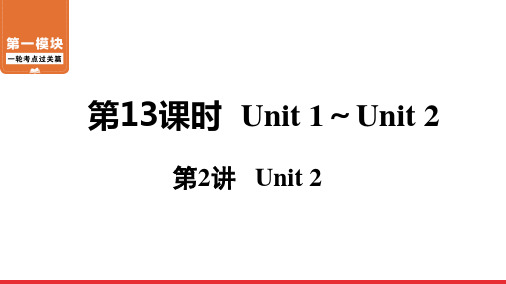
举例 The sun r ises in the east. 太阳从东方升起。 Pr ices have r isen a lot in the past few weeks. 过 去几周,物价上涨了很多。 Luther r ose slowly fr om the chair. 卢瑟慢慢地 从椅子上站起来。
词汇
含义
举例
①举起;升起 r aise one's hand 举起手
r aise ②增加
及物动词,可加宾
r aise incomes 增加收入
语
③筹集(金钱等) r aise money 筹钱
④抚养
r aise a pet 养宠物
上页 栏目导航 下页
中考状元 ·生物
词汇
r ise 不及物动词
含义
①上升 ②增长 ③站立
上页 栏目导航 下页
中考状元 ·生物 辨析raise / rise
【例句】 For example,we can make plans to visit sick childr en in the hospital or
r aise money for homeless people. 例如,我们可以制定计划去看望医院里的患儿或为无家可归的人筹钱。(Unit 2 P12)
上页 栏目导航 下页
中考状元 ·生物
imagine
【例句】 Or imagine you can't walk or use your hands easily. 或者想象一下你不 能走路或不能自如地使用你的手。(Unit 2 P14)
上页 栏目导航 下页
中考状元 ·生物
如:(1)I can't imagine the life without water in the future. 我无法想象未来没有水 的生活。
中考英语一轮复习 人教版八下 Unit2 课程教学设计
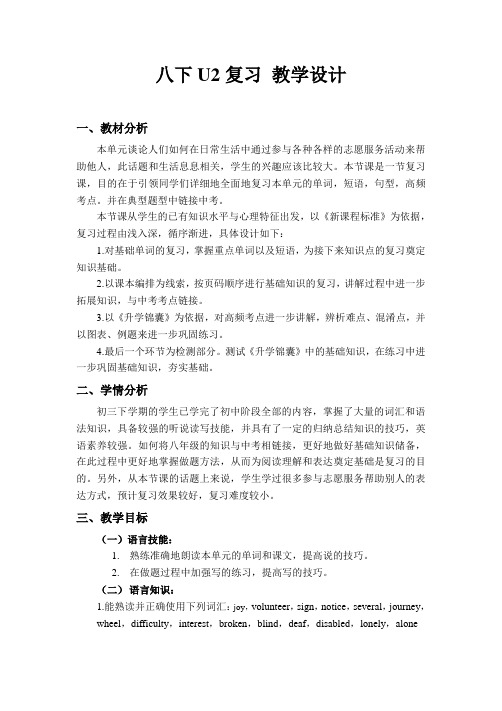
八下U2复习教学设计一、教材分析本单元谈论人们如何在日常生活中通过参与各种各样的志愿服务活动来帮助他人,此话题和生活息息相关,学生的兴趣应该比较大。
本节课是一节复习课,目的在于引领同学们详细地全面地复习本单元的单词,短语,句型,高频考点。
并在典型题型中链接中考。
本节课从学生的已有知识水平与心理特征出发,以《新课程标准》为依据,复习过程由浅入深,循序渐进,具体设计如下:1.对基础单词的复习,掌握重点单词以及短语,为接下来知识点的复习奠定知识基础。
2.以课本编排为线索,按页码顺序进行基础知识的复习,讲解过程中进一步拓展知识,与中考考点链接。
3.以《升学锦囊》为依据,对高频考点进一步讲解,辨析难点、混淆点,并以图表、例题来进一步巩固练习。
4.最后一个环节为检测部分。
测试《升学锦囊》中的基础知识,在练习中进一步巩固基础知识,夯实基础。
二、学情分析初三下学期的学生已学完了初中阶段全部的内容,掌握了大量的词汇和语法知识,具备较强的听说读写技能,并具有了一定的归纳总结知识的技巧,英语素养较强。
如何将八年级的知识与中考相链接,更好地做好基础知识储备,在此过程中更好地掌握做题方法,从而为阅读理解和表达奠定基础是复习的目的。
另外,从本节课的话题上来说,学生学过很多参与志愿服务帮助别人的表达方式,预计复习效果较好,复习难度较小。
三、教学目标(一)语言技能:1.熟练准确地朗读本单元的单词和课文,提高说的技巧。
2.在做题过程中加强写的练习,提高写的技巧。
(二)语言知识:1.能熟读并正确使用下列词汇:joy,volunteer,sign,notice,several,journey,wheel,difficulty,interest,broken,blind,deaf,disabled,lonely,alone2.能熟读并正确使用下列日常用语:clean up ,cheer up, give/hand out, put off, fix up, give away, set up...3.掌握重点句型。
中考英语一轮复习 八下 Unit1 课程教学设计
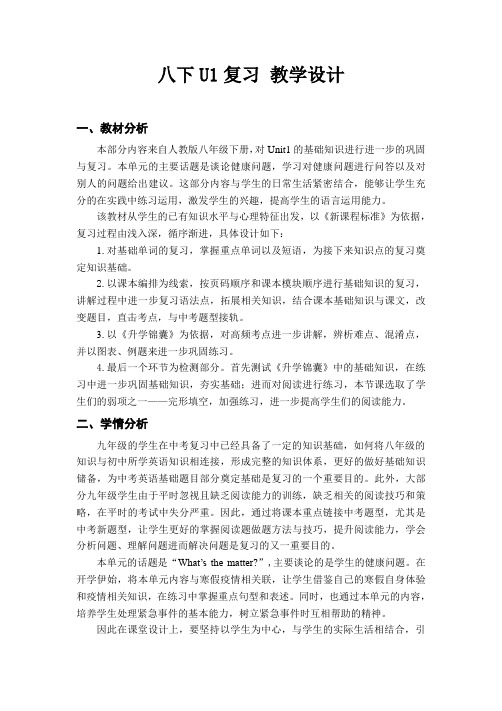
八下U1复习教学设计一、教材分析本部分内容来自人教版八年级下册,对Unit1的基础知识进行进一步的巩固与复习。
本单元的主要话题是谈论健康问题,学习对健康问题进行问答以及对别人的问题给出建议。
这部分内容与学生的日常生活紧密结合,能够让学生充分的在实践中练习运用,激发学生的兴趣,提高学生的语言运用能力。
该教材从学生的已有知识水平与心理特征出发,以《新课程标准》为依据,复习过程由浅入深,循序渐进,具体设计如下:1.对基础单词的复习,掌握重点单词以及短语,为接下来知识点的复习奠定知识基础。
2.以课本编排为线索,按页码顺序和课本模块顺序进行基础知识的复习,讲解过程中进一步复习语法点,拓展相关知识,结合课本基础知识与课文,改变题目,直击考点,与中考题型接轨。
3.以《升学锦囊》为依据,对高频考点进一步讲解,辨析难点、混淆点,并以图表、例题来进一步巩固练习。
4.最后一个环节为检测部分。
首先测试《升学锦囊》中的基础知识,在练习中进一步巩固基础知识,夯实基础;进而对阅读进行练习,本节课选取了学生们的弱项之一——完形填空,加强练习,进一步提高学生们的阅读能力。
二、学情分析九年级的学生在中考复习中已经具备了一定的知识基础,如何将八年级的知识与初中所学英语知识相连接,形成完整的知识体系,更好的做好基础知识储备,为中考英语基础题目部分奠定基础是复习的一个重要目的。
此外,大部分九年级学生由于平时忽视且缺乏阅读能力的训练,缺乏相关的阅读技巧和策略,在平时的考试中失分严重。
因此,通过将课本重点链接中考题型,尤其是中考新题型,让学生更好的掌握阅读题做题方法与技巧,提升阅读能力,学会分析问题、理解问题进而解决问题是复习的又一重要目的。
本单元的话题是“What’s the matter?”,主要谈论的是学生的健康问题。
在开学伊始,将本单元内容与寒假疫情相关联,让学生借鉴自己的寒假自身体验和疫情相关知识,在练习中掌握重点句型和表述。
同时,也通过本单元的内容,培养学生处理紧急事件的基本能力,树立紧急事件时互相帮助的精神。
- 1、下载文档前请自行甄别文档内容的完整性,平台不提供额外的编辑、内容补充、找答案等附加服务。
- 2、"仅部分预览"的文档,不可在线预览部分如存在完整性等问题,可反馈申请退款(可完整预览的文档不适用该条件!)。
- 3、如文档侵犯您的权益,请联系客服反馈,我们会尽快为您处理(人工客服工作时间:9:00-18:30)。
英语学科个性化教学辅导教案Step 1 作业检查及复习作业完成情况:优□良□中□差□Step 2 OutlineStep 3 Language points / Grammar / Language points& Grammar考纲词汇Unit 11.raise: lift up, move from a low to a high, collect, collect, grow and produce v. 饲养;种植;举起;抬起;募集2.teenager: boys and girls are between 13 and 19 n. 青少年3.offer: say what one is willing to pay, give or exchange v. 主动提出;给予4.illness: in bad health, state of being ill n. 生病;某种疾病(ill adj. 不好的;恶意的;有病的)5.suffer: feel or have pain, experience pain of difficulty v. 遭受;经历6.serious: important or thoughtful adj. 严重的;严肃的(seriously adv. 严肃地;严重地)anize: put into working order, arrange in a system v. 组织;筹划(organization n. 组织)8.lonely: sad, without companies adj. 孤独的;寂寞的(loneliness n. 孤独;寂寞)9.peace: quiet, calm, state of freedom from war n. 和平;宁静(peaceful adj. 和平的;平静的)10.hurt=injure/damage v. 使受伤;伤害(hurt-hurt-hurt)11.courage=bravery n. 勇气12.pay: give sb. money for goods or service v. 付费;付款(pay-paid-paid)13.pain: suffering of mind or body n. 疼痛(painful adj. 痛苦的)14.express: make known, show by words, looks, actions v. 表达;表示(expression n. 表情)15.spirits: state of mind (as being happy, hopeful, etc. or the opposite) n. 心境;情绪Unit 2municate=join or connect/ be in contact v. 传播;交流(communication n. 交流)2.accept=receive v.接受(acceptable adj. 可接受的)3.reject=refuse v. 拒绝4.gesture: movement of the hand or head n.姿势;手势5.message=a piece of news n. 信息;消息6.bored: make sb. feel tired by being dull adj. 无聊的;无趣的7.sign: take a deep breath v. 叹气8.appear=come along/show up v. 出现;显现(appearance n. 外貌;外观;出现)9.impression: effect produced on the mind or feeling n. 印象(impress v. 给......以深刻印象)10.towards: in the direction of/ near prep. 朝;向;接近11.hold: catch/get, keep in one’s possession v. 抓住;使保持(hold-held-held)12.remind: make sb. think of v. 使想起;提醒13.cross: mark made by drawing one line across another/ go across v. 使交叉;交叠;通过14.shake: move from side to side or up and down v. 使摇动;使震撼(shake-shook-shaken)15.sure=certain/confident adj. 确信的;有信心的(surely adv. 无疑;一定;确实)16.meaning: what is meant or intended n. 意思(mean v. 意思是;意味着)nguage: human method of communicating ideas, feelings by means of a system of sounds n. 语言18.matter: sth. to which attention is given; pieces of business n. 事情;事物19.nod: bow the head slightly and quickly as a sign of agreement or greeting v. 点头考纲短语Unit 11. Offer to do = help to do/supply to do 主动提出做某事2. Suffer... From...=go through/be in pain 遭受......灾难(病痛)3. Teach sb to do sth 教某人做某事4. Spend time (in) doing sth = It takes sb time to do sth 花时间做某事5. Continue doing sth = go on doing 继续做某事6. Have difficulty doing sth = have trouble doing sth 做某事有困难7. Need to do = require to do 需要做......8. Use sth for doing = use sth to do 用... ...做... ...9. Take photos of 给... ...照相10. Want to do = would like to do = feel like doing 想做某事11. Decide/plan/want/learn/begin/hope to do 决定/计划/想/学/开始/希望做某事12. Do some voluntary work 做义工13. A girl called Cindy = a girl named Cindy 一个叫做Cindy 的女孩14. Express one’s feelings 表达某人的感情15. Bring sb joy and peace = make sb joyful and peaceful 带给某人快乐平和Unit 21. Make a good impression on sb = give sb a good impression 给某人留下好印象2. Remind sb about sth = make sb remember sth /warn sb of sth 提醒某人记得某事3. Sit up 坐直了4. A well-dressed lady 一位衣着考究的女士5. Enter = go into 进入6. Make people feel welcome 让人觉得受欢迎7. Hold one’s head up 抬头8. At once = immediately = in no time = right away 立刻;马上9. Cross one’s arms 双手环抱胸前10. Try to do sth = attempt to do 努力做某事(try doing sth 尝试做某事)11. Decide to do = make a decision to = make up one’s mind to do 决定做某事12. Nod one’s head 点头shake one’s head 摇头13. Look friendly/happy/bored 看起来友好/开心/无聊重点句型(U1〜U2)1.We spent time with a girl called Vivien.我们和一个叫Vivien的女孩一起度过的时光。
2.I taught them to sing because music can bring them joy and peace.我教他们唱歌因为音乐可以给他们带来快乐和宁静。
.3.They have difficulty walking or moving.他们走路和移动有困难。
4.It takes us one hour to do sports after school daily.我们每天放学后花1小时做运动。
Joe enjoys helping others and continues to help people in need in his free time.Joe乐于助人并且继续在他业余时间帮助需要帮助的人。
6.What's the matter with you? = What's wrong with you? = What's up?你怎么啦?municating is more than just speaking.交流不仅仅是说话。
8.Why don’t you go skating? =Why not go skating?为什么不去滑冰呢?9.It s the way you stand and sit.就是你站和坐的方式。
10.She wanted to remind me that tomorrow is her birthday.她想提醒我明天是她生日。
重点词汇讲解1. raise v.: collect; increase in amount, size or other things; put up 筹募;提高;举起We have great difficulty in raising the money.我们筹集这笔钱有很大困难。
